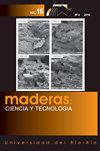OSB sandwich panel with undulated core of balsa wood waste
IF 1.5
4区 农林科学
Q3 MATERIALS SCIENCE, PAPER & WOOD
引用次数: 0
Abstract
The production of wood-based materials is currently being expanded by the furniture industry and civil construction sector. In order to find new alternatives for the panel market, new configuration possibilities (geometry) of panels and the use of renewable raw materials must be explored. In this scope, the objective of this research was to evaluate OSB sandwich panels with an undulated core and flat faces (OSBUC panels) made of Balsa wood waste strands ( Ochroma pyramidale) bonded with two-component castor oil polyurethane resin for use in civil construction. Two types of panels were produced with 13 % resin and varying the density of the core (OSBUC-T1 - faces 550 kg/m³ and core 400 kg/m³) and (OSBUC-T2 - faces 550 kg/m³ and core 500 kg/m³). The water absorption and thickness swelling of the face panels were determined based on the Brazilian standard NBR 14810 and the bending test properties of the OSBUC panels determined by the recommendations of the ASTM C393 standard. The results obtained were compared with the specifications of the PS-2-10 – “Performance Standard for Wood-Based Structural-Use Panels” that provides bending stiffness (EI) values and maximum bending moment (FbS) requirements for OSB panels according to different classes of use. The sandwich panels had maximum values of EI 6,48 x 106 N ·mm²/mm and FbS 3065 N·mm/mm. The OSBUC-T1 treatment proved to be the most efficient, as it has mechanical properties that meet the normative recommendations for structural use and as flooring, with lower material consumption (lower density).OSB夹层板与起伏的核心巴尔沙木材废料
目前,家具工业和民用建筑部门正在扩大以木材为基础的材料的生产。为了为面板市场找到新的替代品,必须探索面板的新配置可能性(几何形状)和可再生原材料的使用。在此范围内,本研究的目的是评估由巴尔萨木材废股(Ochroma pyramidale)与双组份蓖麻油聚氨酯树脂粘合而成的具有波纹芯和平面的OSB夹层板(OSBUC板)在民用建筑中的应用。两种类型的面板用13%的树脂生产,并改变芯的密度(OSBUC-T1 -面550 kg/m³和芯400 kg/m³)和(OSBUC-T2 -面550 kg/m³和芯500 kg/m³)。面板的吸水率和厚度膨胀率根据巴西标准NBR 14810进行测定,OSBUC面板的弯曲试验性能根据ASTM C393标准的建议进行测定。将得到的结果与PS-2-10《木基结构用板性能标准》的规范进行了比较,该标准根据不同的使用类别提供了OSB板的弯曲刚度(EI)值和最大弯矩(FbS)要求。夹层板的EI最大值为6.48 × 106 N·mm²/mm, FbS最大值为3065 N·mm/mm。OSBUC-T1处理被证明是最有效的,因为它的机械性能符合结构使用的规范建议,作为地板,材料消耗更低(密度更低)。
本文章由计算机程序翻译,如有差异,请以英文原文为准。
求助全文
约1分钟内获得全文
求助全文
来源期刊

Maderas-ciencia Y Tecnologia
工程技术-材料科学:纸与木材
CiteScore
2.60
自引率
13.30%
发文量
33
审稿时长
>12 weeks
期刊介绍:
Maderas-Cienc Tecnol publishes inedits and original research articles in Spanish and English. The contributions for their publication should be unpublished and the journal is reserved all the rights of reproduction of the content of the same ones. All the articles are subjected to evaluation to the Publishing Committee or external consultants. At least two reviewers under double blind system. Previous acceptance of the Publishing Committee, summaries of thesis of Magíster and Doctorate are also published, technical opinions, revision of books and reports of congresses, related with the Science and the Technology of the Wood. The journal have not articles processing and submission charges.
 求助内容:
求助内容: 应助结果提醒方式:
应助结果提醒方式:


